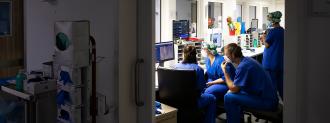The University of Washington School of Medicine has begun to enroll frontline healthcare workers in a small study testing the effects of psychedelic-assisted therapy for depression and anxiety.
The pandemic has taken a toll, physically and psychologically, on workers in an already stressful profession.
“We’re looking for doctors, nurses and advance-practice providers who have clinically significant symptoms of depression and anxiety,” lead investigator Anthony Back said. “We hope to help them address their feelings of grief, inadequacy and moral distress as a result of caring for COVID patients.”
Subjects will be broken into placebo and psilocybin groups, with all getting therapy sessions with specially trained therapists, as well, in the first study of psilocybin-assisted therapy for clinicians.
“We really need to explore what the things are we can do to change up the mental well-being of our [populace],” Back told Seattle’s KING-TV.
“I think we’re totally at a tipping point.”
The pandemic has taken a toll, physically and psychologically, on workers in an already stressful profession.
A second pandemic: Frontline healthcare workers had high rates of mental health issues before the pandemic, Jessi Gold, an assistant professor of psychiatry at Washington University in St. Louis, told CNN.
“Health care workers are not people who had good mental health before Covid,” Gold said. “It’s not like Covid came and all of a sudden we’re having problems. We had longstanding problems.”
But the pandemic has exacerbated the psychiatric struggles of a career already rife with burnout and anxiety.
A national poll by the Kaiser Family Foundation (KFF) and the Washington Post found that a majority of frontline healthcare workers say that the stress and anxiety brought on by the pandemic’s relentless march has negatively impacted their mental health; 30% have received, or feel they need, mental health treatment.
The survey also found medical staff were suffering from lack of sleep, frequent head and stomach aches, and are consuming more alcohol. A survey by Mental Health America found emotional exhaustion to be their most common feeling.
John Hick, a doctor at Minnesota’s Hennepin Healthcare, told reporters that the experience is like “drinking from a fire hose.” And to top it all, clinicians are encountering more hostility from patients and family members.
“Now people are yelling at you and telling you that you don’t know anything,” Gold told CNN. “So it’s like a fire hose in a setting that hates you.”
“What I hear my colleagues say is, ‘I don’t think I can keep doing this,’” UW’s Back said.
Previous studies have shown potential for the use of psilocybin treatment for depression, taken in controlled conditions and and with therapy.
Psilocybin vs. SARS-2: Previous studies have shown potential for the use of psilocybin treatment for depression, taken in controlled conditions and in addition to therapy.
The UW trial, first announced early this year, will be a small one, enrolling only 30 volunteers, split into placebo and psilocybin groups. A research-backed questionnaire will confirm their depression symptoms, and be administered again at the end of the study to assess the drug’s impact.
All of the participants will have two 90-minute sessions with therapists to gain a rapport and learn about their upcoming experience, preparation work researchers have found to be important in psychedelically-assisted therapies.
On their third visit, volunteers will either receive synthesized psilocybin or a placebo — placebos being one of the trickier aspects of studying psychedelics, since patients often can tell after the fact what they received.
After their trip (or not), both groups will have three more sessions to discuss their experiences and how to apply them — what psychedelic therapists refer to as “integration.”
There is a feeling in the psychedelic world that these new treatment methods are not just exciting but needed. And there may be few people more in need of mental health help right now than healthcare workers.
We’d love to hear from you! If you have a comment about this article or if you have a tip for a future Freethink story, please email us at [email protected].






